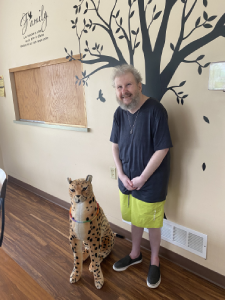Browse the latest People Inc. and affiliate news, updates and press releases.
Weather-related or other closing updates for programs/services are available. Learn more
Residential Settings Provide Vital Supports for People with Prader-Willi syndrome
May 23, 2024
Prader-Willi Syndrome is not widely known, but it is on the list of diagnoses that qualify people for services from the NY State Office for People With Developmental Disabilities.

Spink in the dining room at his home with his cheetah Tom.
People Inc. provides support to 14 people with Prader-Willi syndrome in three specially designed community-based residences in Western New York and Rochester.
According to the Prader-Willi Syndrome Association|USA, it is a rare and complex genetic disorder characterized by chronic hunger, growth hormone deficiency and behavior challenges. It is estimated to affect 350,000 people worldwide. Prader-Willi syndrome is an abnormality on the 15th chromosome. It usually does not run in families.
Prader-Willi varies from person to person, but key features include: insatiable hunger, problems swallowing, high pain tolerance, difficulty regulating body temperature, growth deficiencies, and behavior issues. Sometimes learning disabilities and developmental delays are evident.
For many people, the group home setting and staff supervision can be a welcome support. Chris Spink has lived in a People Inc. residence in Lackawanna since 2008. He describes his daily life as complicated.
“It’s more than an eating disorder, there is a chromosome that doesn’t allow my brain to work like it should. I used to weigh 311 pounds, now I’m down to 130,” Spink said. “Since there is nothing to remind us that we are full everything we eat must be locked up so that we are not tempted to think about and try to get to food outside of mealtimes. This helps to keep us safe.”
“Also, everything we eat is based on what the dietician puts together based on controlled portions and limited calories. We can change something out if we don’t like it – but I like everything that’s on the menu.”
In addition to enjoying the structure set up for him, Spink takes part in a wide variety of hobbies and activities, both at his home and in the community.
People Inc. Residential Director Ed Gramse finds it very rewarding to watch the people who live in the residences explore their lives and grow. He explained that the reality for people with Prader-Willi syndrome is that thinking about food is very intrusive and so much of our culture revolves around food and food-related activities. The structure provided in the residences helps take away some of the anxiety and stress associated with always thinking about food.
“Whether it is daily life in the home or activities in the community, everything has to be pre-planned. The steps that are needed to encourage a safe and enjoyable life do not feel like restrictions to the residents, they understand what is needed to enrich their lives and achieve higher levels of independence.”
People Inc. Behavior Intervention Specialist Michael Herrmann works with the people who live in the residences and their staff to encourage engaging in the world on their terms, yet with the safety of structure. “Don’t judge a book by its cover just because someone is overweight or might be having a difficult moment. Get to know the person and support them.”
 People Inc.
People Inc.